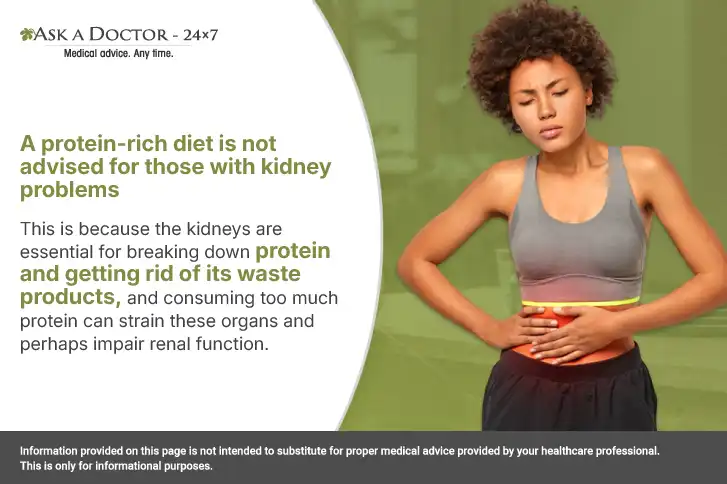Know The Dangers Of Eating Too Much Protein
We are all aware that for several years, the nutritional supplement industry has been actively promoting high-protein diets, which are defined as an intake beyond the current recommended dietary allowance. Many gym-going adults, athletes, and bodybuilders view these diets as "the gold standard" for gaining muscle or losing body fat. However, they overlook the associated risks of using them, adding metabolic strain on their liver, kidneys, and bones. On the contrary, specialists assert that excessive consumption of protein supplements or a high-protein diet may lead to long-term health problems for such individuals.
The fad of excessive protein consumption has mainly stemmed from misguided beliefs that protein powder would boost performance-enhancing abilities. In this blog, we will explore not only the dangers of consuming excessive protein but also the amount of protein that is essential for you.
How Much Protein is Essential for You?

One of the three main "macronutrients" (together with fat and carbs) is protein. It is necessary for life processes because it is a component of all human cells and plays a vital role in the body's metabolic processes. Protein is crucial for building muscles, healing tissue, growth and development, immune function, and the production of enzymes and hormones. Therefore, eating enough protein is necessary not only to prevent malnutrition but is also crucial to maintaining strength and muscular mass as we age.
The recommended daily allowance (RDA) for protein is determined based on body weight. 0.8 grams per kilogram of body weight is the recommended daily amount (RDA) based on weight. It is calculated as:
- Convert body weight from pounds to kilograms by dividing by 2.2. e.g., if one weighs 160 lbs., then the weight in kg is 160/2.2= 72.7 kg
- Calculate the recommended protein intake by multiplying weight in kg by the RDA of 0.8 g/kg, so protein intake is 72.7x 0.8= 58 g
Hence, for a 160 lbs person, the recommended daily allowance of protein is approximately 58 grams.
Also, the recommended daily amount of protein consumption varies according to age group or activity level. Here’s the breakdown:
- In sedentary adults: 0.8g/kg
- Athletes: 1.2-1.4g/kg
- Resistance Trained Athletes: 1.6-1.7g/kg
- Older Adults: 1-1.2 grams of protein per kilogram of body weight
Why Eating Too Much Protein is Harmful?
If you’re eating more than the recommended amount of protein regularly, you’re probably overdoing it. Signs that you’re consuming more protein than advised include:
- Digestive issues: Consuming excessive amounts of protein, particularly red meat, can result in unpleasant stomach issues like diarrhoea, constipation, and bloating.
- Bad breath: Ketosis, a metabolic condition that occurs when your body begins burning fat for energy, can be brought on by eating too much protein, particularly if you aren't getting enough carbohydrates in your diet. One of the negative effects is what is known as "keto breath".
- Dehydration: Your kidneys are in charge of removing waste, including protein byproducts, from your blood. They require water to function properly, but dehydration can occur when they are under stress, such as when consuming excessive protein.
- Weight gain: Consuming a lot of protein means consuming more calories as your body converts excess protein into fat, while the surplus of amino acids is excreted. Hence, if on a weight loss journey, then knowing how much protein you need to maintain your recommended weight is crucial.
- Kidney problems: Consuming excessive protein can cause your kidneys to work harder, potentially harming them or exacerbating pre-existing kidney issues. Less water intake and excessive protein consumption are important risk factors for kidney stones.
- Foamy urine: One indication that you should see a doctor right away is foamy urine. A high amount of protein in your urine, known as proteinuria, can indicate kidney injury if it is foamy or bubbly.
- Heart Disease: A person eating a high-protein diet that consists mostly of animal-based protein sources may be associated with a higher risk of heart disease due to high saturated fat and cholesterol content.
Best Sources of Protein
We can get protein from plant or animal sources. The body requires the necessary amino acids for running several processes, which proteins supply.
Animal-based proteins include:
- Lean meats: Lean beef cuts, turkey breast, and chicken breast are all great protein sources with low fat content.
- Fish: Protein and healthy omega-3 fatty acids are found in salmon, tuna, and other fish.
- Eggs: A complete protein source that may be utilized in a variety of dishes.
- Dairy: Sources include Greek yogurt, cottage cheese, and milk, which are excellent sources of protein.
Plant-based proteins include:
- Legumes: Chickpeas, lentils, and other beans are a great source of fiber and protein.
- Nuts and seeds are a good source of protein and beneficial fats. These include almonds, walnuts, peanuts, pumpkin seeds, and sunflower seeds.
- Soy products: Complete protein can be found in soy-based foods, including tofu, tempeh, and edamame.
- Quinoa: It is not only a good source of protein but is also rich in fiber and other nutrients.
Conclusion
We must understand that for healthy people, even eating too much of a good thing, over a period of time, could be harmful. It is imperative to strike a balance between protein intake and the health conditions of an individual, along with individual needs, into account. A healthy and long-lasting approach to eating protein or other macronutrients requires moderation and a sustainable approach. It's also critical to understand when to seek medical assistance from your healthcare provider. Discuss with your doctor if you are taking sufficient protein in your diet and not overdoing it to avoid risks like digestive issues, kidney damage, and heart disease.
If you have any questions related to high protein consumption and its after-effects, you can ask our Internal Medicine Specialist at Ask a Doctor, 24x7. You can also consult our dietician for personalized guidance and a customized diet plan to achieve optimal health.
Recently Answered Questions Related to Protein
- Is Consuming 180 Grams Of Protein Per Day Safe?
- What Causes Elevated Microalbumin Levels In Urine?
- Regular Gym, Protein Diet, Chest Pain After Consuming Protein Product
- Is Whey Protein Powder Good For Health?
- What Causes Elevated Protein Levels In Urine?
- What Do Protein U24, Protein UR, And Protein U ELP Stand For?
- Can a Protein Shake Cause an Allergy?
- What Amount Of Protein Is Recommended for a 30-year-old male weighing 200 Lbs?
Disclaimer: Information provided on this page is not intended to substitute for proper medical advice provided by your healthcare professional. This is only for informational purposes.
Ask a Specialist
Recent Questions


